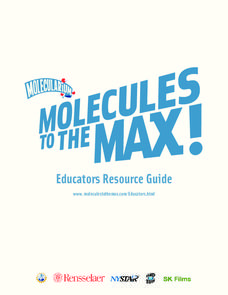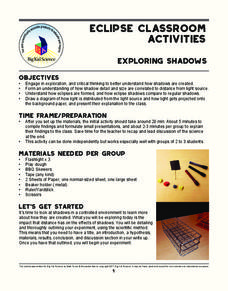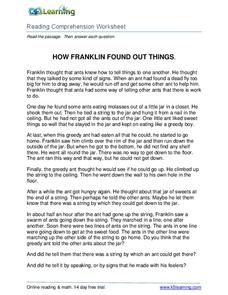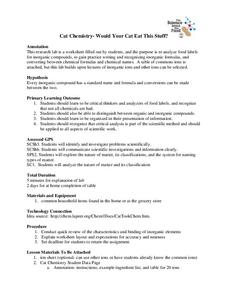Howard Hughes Medical Institute
Gorongosa: Scientific Inquiry and Data Analysis
How does the scientific process begin? Introduce ecology scholars to scientific inquiry through an insightful, data-driven lesson. Partners examine data from an ongoing research study to determine the questions it answers. The resource...
Howard Hughes Medical Institute
Scientific Inquiry Using WildCam Gorongosa
How do scientists determine what questions to ask to meet their research goals? Help your class develop an inquiry mindset with a lesson based on studies in the Gorongosa National Park. Partners create their own research questions by...
Teach Engineering
Better By Design
Which modification is the best? Using the scientific method, pairs determine the effects of each control surface on the distance of a glider's flight. The activity, section 16 in a 22-part unit on aviation, allows pupils to gain a better...
Rensselaer Polytechnic Institute
Molecules to the Max!—Educators Resource Guide
From molecules to nanotubes, an engaging unit explores the world of tiny science. Fifteen hands-on experiments and lessons engage young scientists as they learn chemistry. Discussions, worksheets, and data analysis reinforce the concepts...
Towson University
Mystery Tubes
How do scientists know they're right? Truth be told, they don't always know. Explore the scientific process using mystery tubes in an insightful activity. Young scientists discover how to approach and solve problems in science, how ideas...
Towson University
Berries...With a Side of DNA?
Sometimes science lab can be ... delicious! Middle school science scholars extract DNA from strawberries and other fruits in an engaging lab activity. The teacher's guide includes pacing, materials list, and worksheets with answer keys.
Big Kid Science
Exploring Shadows
What's that lurking in the shadows? An activity that demonstrates how eclipses happen. Science scholars investigate how light and distance interact to form shadows. The experiment uses simple materials to generate data and observations...
CK-12 Foundation
Scientific Models: Mathematical, Physical and Conceptual
This is one super model interactive! Middle and high school science scholars examine scientific models through a simple resource. Guided, hands-on practice allows them to classify conceptual, mathematical, and physical models. Other...
CK-12 Foundation
Development of Theories
Theory or Law? You decide. And so will your class members, in an insightful interactive. Young scientists divide common scientific principles or statements between the two groups, then dig deeper in understanding the functions of...
CK-12 Foundation
Testing Hypotheses: Einstein
Einstein once said "A person who never made a mistake never tried anything new." Enlist his help in teaching young learners the importance of looking for mistakes in hypotheses. An interactive coaches pupils in the falsifiability of...
CK-12 Foundation
Development of Hypotheses: Pressure versus Temperature
Is it me, or is it getting hot in here? Middle school science sleuths investigate the relationship between temperature and pressure, then use their observations to form a hypothesis. Questions embedded in the interactive help guide...
Cornell Lab of Ornithology
Investigating Evidence
Explore the scientific process through nature. Scholars become scientists as they develop a question, design an experiment, collect data, and analyze their results. A two-week lesson guides your classes through the process and provides...
K5 Learning
Changes
You can't unring a bell, but can you unmelt an ice cube? Readers consider reversible and irreversible changes with a short informational reading passage and accompanying comprehension questions.
K5 Learning
How Franklin Found Out Things
Franklin learns about the world by making observations, and so do we! A short reading assignment prompts fourth graders to answer comprehension questions about a curious boy and what he notices.
American Physiological Society
How Does the Density of a Liquid Affect the Buoyancy of an Object?
Here's a lesson plan that will really float your boat! Introduce physical science scholars to the relationship between buoyancy and density through an assortment of individual and collaborative exercises. Lab groups work together to...
American Physiological Society
What Environmental Conditions Lead to the Hatching of Brine Shrimp?
Will changing the environment in which brine shrimp live impact their reproductive success? Young scientists get hands-on experience studying the habitat of brine shrimp in a two-week immersion instructional activity. The teacher's guide...
American Physiological Society
It’s the Heart of the Matter
Get the class jumping for joy with a fascinating look at matters of the heart. Learners perform physical tasks, collect and analyze heart rate data, and study conditions that affect heart health. Use the action-packed lesson plan to...
American Physiological Society
Thermal Insulators: Keep it Hot!
There's nothing like a cup of hot chocolate on a chilly winter's day. Except for when that hot chocolate quickly becomes lukewarm chocolate ... or even cold chocolate. What material provides the best insulation to keep the chocolate from...
University of Minnesota
Dendritic Spines Lab
This is your brain on drugs ... literally! Your neuroscientists-in-training examine the evidence of drug use on the human brain and how neurons change their connectivity when altered by drugs. They then work together to create testing...
University of Georgia
Would Your Cat Eat This Stuff?
Processed foods use inorganic compounds for flavoring and preservation. This take-home laboratory challenges scholars to find 20 different compounds identified on the labels of foods to list on their data collection sheet. The activity...
Messenger Education
Design Challenge: How to Keep Items Cool in Boiling Water
Keeping items cool in boiling water... what? This engaging activity challenges high school learners to build a container that keeps butter in a solid state when placing the container in boiling water. Groups use previous knowledge and...
Messenger Education
Design Challenge: How to Keep Gelatin from Melting
The inside of the spacecraft Messenger, which explores Mercury, will experience temperatures from 32 to 91 degrees Fahrenheit. In the final installment of a series of four space-related activities, groups spend time discussing and...
Polar Trec
Talk Story: A Native Way of Knowing
The steps of the scientific method examine a problem, make a prediction, and attempt to solve the problem—similar to the path most stories take. In the activity, individuals see how stories can explain natural events similar to the way...
Polar Trec
Down to the Deep Virtual Lab
At a depth of 3,000 m in the ocean, the pressure is 300 times that at sea level! In the activity, individuals predict what will happen to Styrofoam cups submerged 3,000 meters into the ocean. They then convert these units to soccer...

























